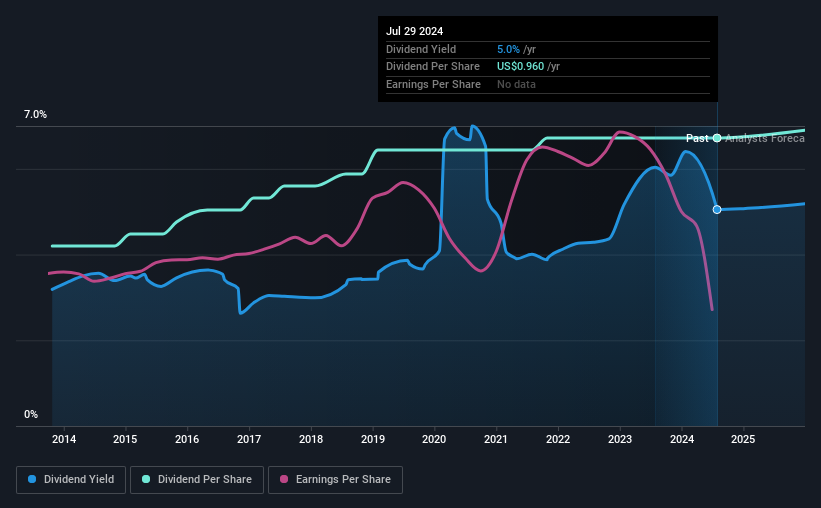- United States
- /
- Banks
- /
- NYSE:PFS
Provident Financial Services (NYSE:PFS) Has Affirmed Its Dividend Of $0.24
Provident Financial Services, Inc. (NYSE:PFS) has announced that it will pay a dividend of $0.24 per share on the 30th of August. This makes the dividend yield 5.1%, which will augment investor returns quite nicely.
View our latest analysis for Provident Financial Services
Provident Financial Services Will Pay Out More Than It Is Earning
We like to see robust dividend yields, but that doesn't matter if the payment isn't sustainable.
Having distributed dividends for at least 10 years, Provident Financial Services has a long history of paying out a part of its earnings to shareholders. Despite this history however, the company's latest earnings report actually shows that it didn't have enough earnings to cover its dividends. This is an alarming sign for the sustainability of its dividends, as it may mean that Provident Financial Servicesis pulling cash from elsewhere to keep its shareholders happy.
Earnings per share is forecast to rise by 58.2% over the next year. If the dividend continues on its recent course, the future payout ratio in 12 months could be 109%, which is a bit high and could start applying pressure to the balance sheet.

Provident Financial Services Has A Solid Track Record
The company has been paying a dividend for a long time, and it has been quite stable which gives us confidence in the future dividend potential. Since 2014, the annual payment back then was $0.60, compared to the most recent full-year payment of $0.96. This implies that the company grew its distributions at a yearly rate of about 4.8% over that duration. Dividends have grown relatively slowly, which is not great, but some investors may value the relative consistency of the dividend.
The Dividend Has Limited Growth Potential
Some investors will be chomping at the bit to buy some of the company's stock based on its dividend history. Unfortunately things aren't as good as they seem. Earnings per share has been sinking by 21% over the last five years. This steep decline can indicate that the business is going through a tough time, which could constrain its ability to pay a larger dividend each year in the future. However, the next year is actually looking up, with earnings set to rise. We would just wait until it becomes a pattern before getting too excited.
An additional note is that the company has been raising capital by issuing stock equal to 72% of shares outstanding in the last 12 months. Regularly doing this can be detrimental - it's hard to grow dividends per share when new shares are regularly being created.
The Dividend Could Prove To Be Unreliable
In summary, while it's good to see that the dividend hasn't been cut, we are a bit cautious about Provident Financial Services' payments, as there could be some issues with sustaining them into the future. We can't deny that the payments have been very stable, but we are a little bit worried about the very high payout ratio. We would be a touch cautious of relying on this stock primarily for the dividend income.
Companies possessing a stable dividend policy will likely enjoy greater investor interest than those suffering from a more inconsistent approach. Still, investors need to consider a host of other factors, apart from dividend payments, when analysing a company. To that end, Provident Financial Services has 4 warning signs (and 1 which doesn't sit too well with us) we think you should know about. If you are a dividend investor, you might also want to look at our curated list of high yield dividend stocks.
New: Manage All Your Stock Portfolios in One Place
We've created the ultimate portfolio companion for stock investors, and it's free.
• Connect an unlimited number of Portfolios and see your total in one currency
• Be alerted to new Warning Signs or Risks via email or mobile
• Track the Fair Value of your stocks
Have feedback on this article? Concerned about the content? Get in touch with us directly. Alternatively, email editorial-team (at) simplywallst.com.
This article by Simply Wall St is general in nature. We provide commentary based on historical data and analyst forecasts only using an unbiased methodology and our articles are not intended to be financial advice. It does not constitute a recommendation to buy or sell any stock, and does not take account of your objectives, or your financial situation. We aim to bring you long-term focused analysis driven by fundamental data. Note that our analysis may not factor in the latest price-sensitive company announcements or qualitative material. Simply Wall St has no position in any stocks mentioned.
Have feedback on this article? Concerned about the content? Get in touch with us directly. Alternatively, email editorial-team@simplywallst.com
About NYSE:PFS
Provident Financial Services
Operates as the bank holding company for Provident Bank that provides various banking products and services to individuals, families, and businesses in the United States.
Flawless balance sheet, undervalued and pays a dividend.
Similar Companies
Market Insights
Community Narratives




